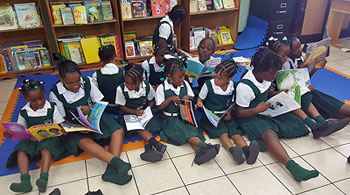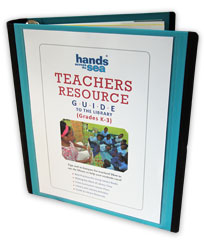How did Hands Across the Sea get started?
In 2007, Harriet and Tom Linskey, lifelong sailors who had built their own 28-foot sailboat and sailed it from California across the Pacific—Baja California, Mexico, the South Pacific, New Zealand, Australia, and Japan in the 1980s—were sailing in the Eastern Caribbean. Harriet, a former school teacher, suggested visiting a primary school in St. Vincent and the Grenadines. The Linskeys received a warm welcome from the principal and teachers, but were dismayed by the lack of reading books for the children—a situation they found during visits to other schools in the region. Further investigation revealed that, due largely to a lack of books, child illiteracy was a widespread problem. The Linskeys founded Hands to help raise child literacy levels, and the nonprofit quickly grew into the largest, most effective child literacy organization serving the Eastern Caribbean.
How do you purchase and ship the books?
We never send worn-out, inappropriate, “donation dumped” books to Caribbean schools. We buy our books new, directly from the world’s leading children’s book and education publishers (for more on the publishers we buy from, see our Hands Partners page). Our Hands Logistics Angels make it possible for us to get the books into the hands of kids in the Caribbean. With the help of volunteers, we sort, pack, and palletize our annual book shipment (80,000 to 100,000 books, plus boxes of teaching resources) every summer in the Harte-Hanks, Inc. warehouse in East Bridgewater, Massachusetts. AIT Worldwide Logistics provides long-haul trucking of the pallets to Riviera Beach, Florida, where Tropical Shipping containerizes the shipment and delivers it to the Eastern Caribbean. The ministry of education on each island shepherds the pallets through customs and, with help from our Hands Literacy Links, gets each box to its destination.
Why do you send books instead of tablets or e-books?
A growing body of research suggests that print books have a direct correlation with increased reading comprehension when compared to digital and e-reading resources. Additionally, the movement around Free Voluntary Reading (FVR) concludes that students who choose what they read and have an informal environment in which to read tend to be more motivated, read more, and show greater language and literacy development. These findings support the approach Hands takes as we continue in our commitment to creating physical libraries and literacy spaces where children may flourish.

Hands Across the Sea recognizes the global movement toward digital learning resources and we appreciate all the wonderful work being done to increase access to online materials. We believe that digital resources are an important component in education. As we continue in our work, we are mindful of the unique role each organization can play in targeted learning and access gaps. While Hands Across the Sea employs digital medium as an auxiliary support, especially with video Read Alouds and other at-home resources, our work remains focused on libraries and books-in-hand.
Do you accept school textbooks and encyclopedias for donation?
Because Caribbean schools follow their own curriculum, we do not accept or send textbooks—invariably, old donated textbooks end up occupying precious shelf space in the school library and are not utilized by teachers. Nor do we accept old, donated encyclopedia sets; sending out-of-date material that has little value in the U.S. does not somehow give it value in the Caribbean.
Why do the “donation dumpers” continue to send worn-out, inappropriate books to Caribbean schools?
Well-meaning but misguided book-donation agencies, aid groups, publishers, and individuals do harm by sending old, inappropriate books to the Caribbean, particulary to schools. Donation dumpers believe, mistakenly, that “any books are better than no books”; they do not understand that something which is of no value in the U.S. or Canada or the U.K. is equally valueless in the Caribbean; they receive tax deductions for material that costs them nothing. Some education ministries in the Caribbean accept such donations in the hope, rarely realized, that something good will come in someday.
How much of my donation goes directly to helping Caribbean kids?
Hands Across the Sea is run as cost-effectively as possible—we put your donation to work helping kids fall in love with books and reading. We believe very strongly in the cause of child literacy (all of us at Hands have taken a substantial pay cut from our previous careers to dedicate ourselves to this mission). Our organization has no offices (Hands staff, including our Literacy Links, work from home) and we avoid non-essential expenses. Our staff salaries follow nonprofit norms published by Guidestar, a group that monitors U.S.-registered charities. Eighty percent of your donation goes directly to helping raise the literacy levels of Caribbean children—this includes paying for books and all of the ways that Hands staff and Literacy Links support Hands Wish Lists projects, such as helping to create or rejuvenate lending libraries through our CLASS program. Hands has earned the GuideStar Platinum Level of Transparency and the Top-Rated Nonprofit seal from Great Nonprofits.
How do I know that my donation is helping? How does Hands measure success?
There is a lot of research that shows that access to great books advances reading and literacy. We are helping schools to create a literacy-rich environment, and we measure success by the establishment of clean, bright, organized lending libraries in the selected schools. Our work is a partnership between educators, students, donors and Hands Across the Sea staff. All of us working together will advance and improve child literacy in the Eastern Caribbean.

- We visit each school we serve to assess the results in person and to ensure proper stewardship of donors’ funds. We ask to see student borrowing records, and we ask for quantitative information about the numbers of girls and boys using the library and the numbers of books they borrow. We conduct surveys of teachers to determine how the library is being used and what improvements can be made to ensure widespread adoption of the library and deployment of best practices for integrating library resources into classroom instruction.
- We ask principals and teachers to keep us updated on grade 2, 4 and 6 national assessment results and how their students are faring on reading and writing. We love hearing about students who have made significant progress thanks to access to new exciting books. You can read some of this feedback on the Hands page at Great Nonprofits.
- We regularly see students excited about reading and their new library. Check out the “When Dreams Come True” video on the Hands Video page to understand the impact from some students’ point of view. We see these results year after year in letters, e-mails and videos from the schools. In the long-term, we hope to hear about more students staying in secondary school, doing well on CXC exams, and pursuing tertiary education.
- We consistently listen and learn about what’s working and not working in what we do, and each year we find new ways to improve, expand and grow our CLASS program. It is thanks to our donors who consistently support us that we are able to see progress over time.
- Our initiatives and support materials—the Hands Student Librarian program, the Hands Teachers Guide to the Library (Grades K-3), the Hands Library Manual for Primary Schools, and the Hands Remedial Reading Toolkit (reading rescue for high school students) are in wide use across the region.
Do you work in other places in the Caribbean, such as Haiti?
We are keeping our focus on the Windward and Leeward Islands of the Eastern Caribbean: Antigua, Dominica, St. Kitts and Nevis, St. Lucia, St. Vincent and the Grenadines, and Grenada. Though Hands has achieved a lot in the region since 2007, in some ways we have just begun; there is much more to do, from reaching more children with great new books to creating more lending libraries to helping educators raise the literacy levels of their students. We are wary of spreading ourselves too thin, which would reduce the effectiveness of our program—our goal and our focus, as it has been from the beginning, is to transform the child literacy landscape in the Eastern Caribbean.
